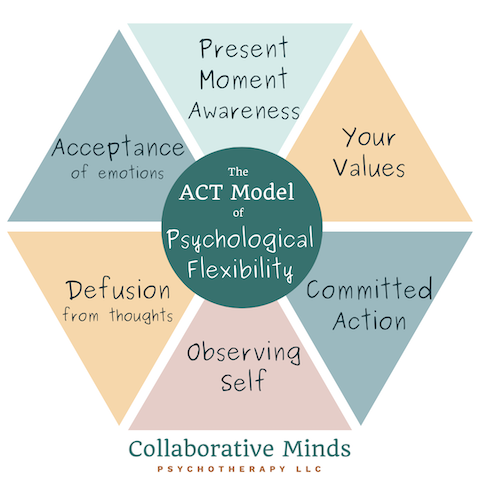What is ACT? How Acceptance and Commitment Therapy Can Improve Your Life
Coming to terms with the problems we have or the pain we may carry can ACTually be very empowering. Keep reading to learn more about how Acceptance and Commitment Therapy can help you to recognize your own resilience and live a rewarding life despite the hardships you may face.
What is ACT?
Acceptance and Commitment Therapy, otherwise known as “ACT” (pronounced like the word “act”), is a fairly new type of therapeutic intervention that incorporates aspects of mindfulness and CBT. What sets ACT apart from most other types of therapy is that it doesn’t focus on “fixing” your problems; in fact, it doesn’t attempt to reduce your symptoms at all. The whole premise of ACT is that adversity is an inevitable part of being human–but we don’t have to let our struggles define who we are or what we can do.
ACT is based on Six Core Principles which help to develop Psychological Flexibility:
Present Moment Awareness - Observing the present moment and remaining in the here and now
Values - Identifying the things that are the most important to you
Committed Action - Taking concrete steps towards reaching your desired outcome
Observation of Self - Viewing your thoughts as an outside observer (“thinking about thinking”)
Cognitive Defusion - Recognizing that your thoughts don’t define you or your situation
Acceptance - Allowing yourself to experience whatever feelings may come up without judgment
How Does ACT Work?
The main goal of ACT is to help individuals end the exhausting battle to control or eliminate all negative experiences (spoiler alert: it’s not possible!) by instead focusing on developing psychological flexibility. Psychological flexibility is the ability to stay grounded in the present moment and intentionally choose to think and behave in ways that align with our goals and values; to put it simply, it’s the ability to take what you need and leave the rest. When working with an ACT therapist, the initial sessions typically focus on identifying what your core values are and helping you to connect with them. From there, your therapist may take time each session to review the previous week and help you to examine how your thoughts and behaviors either helped or hindered your progress. It is also common to learn and practice mindfulness activities in ACT sessions, such as guided meditations or grounding exercises.
Who is ACT For?
ACT has been shown to help individuals who are struggling with several conditions, including:
Depression
Anxiety
Trauma
Eating disorders
Obsessive-compulsive disorder (OCD)
Substance use disorders
Adjustment and stress disorders
Physical ailments
Chronic pain
Psychosis
And more!
ACT was originally developed for adults (and has been shown to be particularly effective in older adults), but it has also been adapted for use with teens. It isn’t typically recommended for children because it involves a lot of abstract thinking, which younger brains are not developmentally ready for.
Getting Started with ACT
Does it sound like you or your teen might benefit from ACT? The first step is finding a therapist or counselor who can help. At Collaborative Minds Psychotherapy, we have several therapists who utilize ACT in their sessions and have availability for individual therapy with both adolescents and adults.
Asking for help can be scary, but we’re here to support you every step of the way! Contact ustoday to schedule a free 15-minute call with our intake coordinator to learn more about our services and to discuss whether or not ACT might be right for you.

